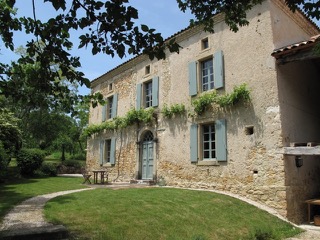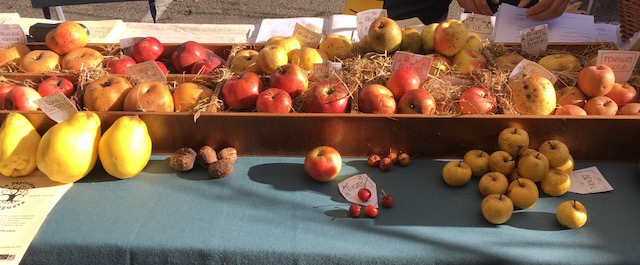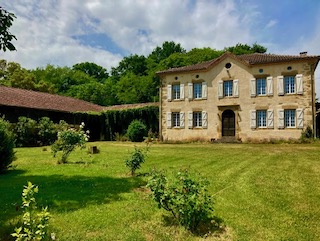View from the Foothills of France Some personal views on living, working,
bringing up family and making the dream happen in the most beautiful region of France. View from the Foothills of France also includes some personal and professional thoughts and tips on finding and buying the perfect property in the Ariège and Haute Garonne regions.
|
By nadia, on 7th December 2021 
After many years of helping clients to find their perfect property here in France based, in the first instance, on a detailed list of their requirements, what I have learned above all is that a property can tick every box but still not be ‘the one’. While most of us have easily defined opinions about what we know we like and dislike and many of our reactions to a property are conscious and objective, it seems that others are far more unconscious and visceral, bound up with our less definable personal instincts and experiences.
What is it about a space that makes us feel at home? On the most fundamental level, human beings have a need for shelter and security. But beyond that we also want comfort, beauty, stimulation, and connection with those around us and with the world outside.
When children are asked to draw a home, they commonly draw houses with steeply pitched roofs, even when they themselves live in flats, according to Lily Bernheimer, a researcher in environmental psychology. The pitched roof symbolises shelter and enclosure, which we need to make ourselves feel secure. Our homes need to feel like a place of refuge from the rest of the world. This psychology informs, albeit often unconsciously, our reaction to a property.
As Alain de Botton discusses in his book, The Architecture of Happiness, we may seek beauty from design, but there are all sorts of other aspects that we may not even be conscious of that lead us to find buildings and objects attractive or unattractive: “Our feelings of contentment are woven from fine and unexpected filaments. It isn’t sufficient that our chairs comfortably support us; they should in addition afford us a sense that our backs are covered, as though we were at some level still warding off ancestral fears of attacks by a predator.” The same can be said for our home.
He goes on to say; “When we approach front doors, we appreciate those that have a small threshold in front of them, a piece of railing, a canopy or a simple line of flowers or stones – features that help us mark the transition between public and private space and appease the anxiety of entering or leaving a house.”
Trends in current research support de Botton’s assertion that when it comes to design, we are subject to a host of neurological responses we have no control over, and which we may not even recognise. “We’ve been optimising our environments too much for our cognitive mind in recent years, and we need to ignite our senses and bring more awareness to what feels good rather than what we think.” Perhaps what we think we want isn’t actually what makes us feel at home. For example, memories of home are usually associated with the things in it, which you can touch and smell (“the attic and the cellar, the fireplace and the bay window, the hidden corners, a stool, a gilded mirror, a chipped shell”) rather than the building in its entirety, which you can only see.
Which is all a very long way of saying that, while a detailed list of criteria is very important in choosing the right home for you, equally as important, once you have made sure your practical considerations have been taken into account, is to then allow your unconscious self and your feelings to take the lead when viewing a house. I have said it before, but it bears saying again that, while it is important to use your rational, thinking head in working out what you are looking for practically in a property and a location, once this is established, it is equally as important to let your heart have a say.
If you need help or advice with finding your home in France, please get in touch: nadia@foothillsoffrance.com
Like this:Like Loading...
By nadia, on 23rd November 2021 
The French government has announced plans to ban the use of plastic packaging for most fruit and vegetables from January 2022. This follows on from laws which came into effect from January 1st this year banning single-use plastic plates, cups, cotton buds, plastic straws, and cutlery.
The new plastic packaging ban will apply in the first instance to harder fruit and veg such as leeks, peppers, and apples. It will then be rolled out to tomatoes, green beans, and other more delicate items by June 2023 and finally to salads and berries.
Retailers who fail to comply will face hefty fines. About a third of fruit and vegetables sold in France is currently wrapped in plastic. Each consumer will also have the right to be served using their own container, as long as it is clean and adapted to the nature of the product being purchased.
In a further effort to reduce plastic waste, from 2022 there will be a ban on plastic tea bags. Fast-food chains will no longer be able to give away plastic toys and water fountains will become mandatory in public places (including schools) in order to reduce public dependency on plastic bottles. Restaurants will also be compelled to offer free still water to their clients.
There are more proposals in the pipeline to reduce plastic use in France even further in the next few years and it is also now mandatory to provide consumers with accurate information regarding proper waste sorting and details of the composition and recyclability of material.
Here in the foothills, shopping at local markets, home-grown produce, paper bags and shopping baskets have never fallen out of favour and so, again, Southwest France is head of the game when it comes to a more environmentally sustainable way of living but at least now chain supermarkets will be forced to follow suit.
If you are thinking of moving to France or buying a holiday home here, please do get in touch to see how I can help: nadia@foothillsoffrance.com
Like this:Like Loading...
By nadia, on 9th November 2021  Autumn colours in the Pyrenees The French property market is very buoyant and has been for the last two years with house prices in France showing a rise throughout the country of an average of +5.8% this year, which is the 20th consecutive quarter of rising property prices. The projection for house prices in France shows a continuing upward trend of +3.1% during 2022 according to the Notaires de France.
So, if your dream is to buy a property in France either as your main home or a holiday home, it might be worth starting your search sooner rather than later as the era of historically low property prices in France could well be over and already buyers are starting to find themselves priced out of the most popular areas.
There are a few key points to keep in mind as you begin your search, particularly when considering the location, the type of property and how you plan to use it. It can help to make a checklist to keep focused on your priorities and practical considerations (so that, once ticked, you can let your heart take over).
Where do you want to be in France?
Consider climate, accessibility, and surroundings (hills, lakes, coastal, mountains, village or city). Do you want heat and a Mediterranean climate or grass and rivers and forests? Would you like to be close to facilities and services and have neighbours or be isolated (most people tell me they want to be isolated but walking distance to a boulangerie and café!) Do you need to travel frequently in which case you will need to be close to a large city with an airport or a TGV line?
What kind of property do you want?
Consider the number of bedrooms you need and how much land you want. Do you want a character property or something more modern? How about taking on a renovation project or would you rather just move straight in?
Is this a permanent home, a holiday home or are you planning to run a business?
If it is a permanent home, do you plan to work from the house, in which case you will need a good internet connection and an office space. And do you want to be part of a community in which case you probably don’t want to be too isolated. How much land do you want? Ask yourself if you like gardening or prefer sitting on your terrace? If the property is to be a business, consider the type of clientele you are looking to attract and whether the income will be enough to support you especially if it is a seasonal business. And if it is a holiday home, think about how you and your family and friends will use it while there and what activities you are most likely to be looking to do whether that by cycling, walking, skiing, riding, visiting local attractions and towns or sitting in the local café watching the world go by.
There is one other consideration of course; budget
We all have budgets to suit our own circumstances so get an idea online as to what your budget will buy you in different regions, so your expectations are realistic, and you are not disappointed when finally viewing properties for real. When looking at the cost of buying a house in France, remember that you need to calculate for 8-10% of buying costs and whatever work or alterations you want to do to the property.
If you bear all of these things in mind as you begin your search, you are much more likely to find the type of property and location that works best for you.
If you would like help with your property search, please get in touch: nadia@foothillsoffrance.com
Like this:Like Loading...
By nadia, on 21st October 2021 
If you are thinking of buying a property as a long-term investment, you could do much worse than buy a property to let out for holiday rentals in France. Depending on the location, it can be a year-round business with the added benefit of providing a family holiday home. In terms of lifestyle investments, it is certainly more fun than investing in shares or Bitcoin and probably safer too.
Of course, as with any investment, there are disadvantages as well as advantages (the value of your investment may go down as well as up etc!) but, if well-managed, the benefits should certainly outweigh the downsides in the long-term:
Benefits of a holiday rental property
- An opportunity to acquire an asset and use it as an income-generating business
- Generally higher yields than a traditional buy-to-let investment
- Better capital return thanks to the additional value of a business and established rentals
- You and your family can use the property if and when you wish
- Great way to buy and try out a potential future family holiday home
- An excellent alternative retirement/pension income plan
- Demand is strong for self-catering holiday accommodation all over France from the French as well as foreign tourists and, more importantly demand is growing in both markets. Remember, France gets more tourists than any other country in the world
- Holidays in many parts of France have year-round appeal so you have a continuous, annual income stream
- If you are mainly looking for a family holiday home, renting out your property for a few weeks per year can cover all the costs hence effectively providing free holidays
Disadvantages of a holiday rental property
- Involves a lot of management. This will cost you money and /or time. It takes more time and effort than a traditional buy-to-let investment. You can of course employ the services of a property management company but you will need to factor in these costs when working out your budget and your potential return on investment.Initial set-up costs can be high as a holiday rental has to be well-equipped and durable and there will be turnover of high-use items and furnishings.
- Maintenance costs can also be high especially if you are employing someone else to do the cleaning and maintenance
- Mortgages for holiday let properties can be more difficult to obtain and if you do get approval, expect to put down a 25-40% deposit.
- It is worth ensuring that you can afford an extended void period for whatever reason (pandemic anyone?)
- It is important to understand websites, marketing, and social media if you want to ensure bookings. This means making time on a daily basis to work on these, promote your property and deal with enquiries and bookings
How to identify a property that will offer the best holiday let returns
- A cliché though it may be, location is just as important for a holiday house as for a permanent home. When choosing a location, remember to keep potential future clients in mind. Imagine what most guests are likely to be looking for when on holiday
- Make sure there is some ‘wow factor’ whether this is the interior design, incredible views, fantastic coastal, mountain or city location or the facilities provided. Standing out from the crowd will ensure you get noticed and hence get bookings and good reviews
- Keep within two hours of an international airport and major city; accessibility is important
- Target areas with broad appeal and year-round attractions and activities
- Choose an area both where people are likely to want to stay for longer periods at peak times and weekends off-peak
- Make sure your location has a café, a bakery and small shop close-by at the very minimum and preferably a restaurant and good walking, cycling and activities
- Think about the type of property, the quirkier or more characterful the property, the more popular it is likely to be
If you need help finding the perfect French property, please get in touch: nadia@foothillsoffrance.com
Like this:Like Loading...
|
For further information please contact us:
|









You must be logged in to post a comment.